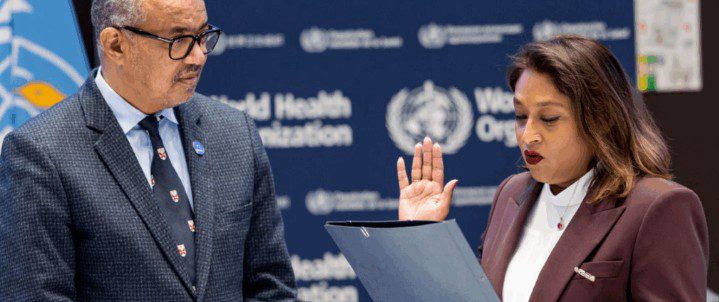The World Health Organization (WHO) has placed Saima Wazed its Regional Director for South-East Asia, on long administrative leave following criminal charges filed against her in Bangladesh and mounting pressure from the country’s interim government.
The decision was quietly taken late last week, according to diplomatic sources in Geneva, and comes amid ongoing investigations by Bangladesh’s Anti-Corruption Commission (ACC), which formally charged Wazed in March 2025 with fraud, forgery, and abuse of power. The charges relate primarily to her controversial 2023 campaign for election to the WHO post, which critics say was orchestrated with the help of her mother, former Prime Minister Sheikh Hasina.
Bangladesh government has reacted to WHO’s decision. ” We welcome the World Health Organization’s reported decision to place Saima Wazed on indefinite leave amid ongoing investigations into serious allegations of fraud, forgery and abuse of power. We view this as an important first step toward accountability” Press Secretary to Chief Adviser said on his verified facebook page.
He added: “We firmly believe that a permanent resolution is necessary, one that removes Ms. Wazed from her position, revokes all associated privileges and restores integrity to this prestigious role and the credibility of the UN system as a whole. The people of Bangladesh and the global public are happy to see the emergence of transparency, honesty, and justice.”
Wazed, who officially began her five-year term in February 2024, had continued to represent the SEARO region at the ongoing World Health Assembly in Geneva—even after Bangladesh issued an arrest warrant for her. She also chaired a high-level briefing for regional member states last weekend, despite her home government severing ties with her office since late 2024.
On 19 March, days before the charges were filed, Bangladesh’s Ministry of Health sent a formal letter to WHO Director-General Dr Tedros Adhanom Ghebreyesus requesting that Wazed be bypassed in all matters relating to the country. The letter, obtained by Health Policy Watch, described her position as “embarrassing” for the government and urged WHO HQ to directly appoint a new Representative to Bangladesh.
In response to mounting diplomatic pressure and the gravity of the allegations, WHO has now moved to sideline Wazed. A WHO spokesperson confirmed on Saturday that Wazed has been placed on administrative leave “pending further review,” but declined to offer additional details, citing the ongoing nature of investigations.
Sources close to the organization say the leave is indefinite and was approved by the Director-General after private consultations with several member states, including Bangladesh, India, and Indonesia. The move effectively suspends Wazed from her duties without terminating her appointment, preserving the legal principle of presumption of innocence while shielding the organization from further reputational damage.
WHO had earlier stated it was aware of the allegations but would not comment while national investigations were underway. However, the optics of a Regional Director facing criminal charges and being rejected by her home government triggered growing disquiet within WHO circles, particularly in the SEARO region.
The fallout has already begun to reshape regional dynamics. Indonesia, Southeast Asia’s largest country, has formally requested a shift from the SEARO bloc to the Western Pacific Region (WPRO)—a highly unusual realignment set to be confirmed during the current World Health Assembly. Timor-Leste is reportedly considering a similar move, while Bangladesh is exploring a transition to WHO’s Eastern Mediterranean Region (EMRO).
Although WHO has denied that Indonesia’s exit is linked to the Wazed affair, minutes from SEARO’s October 2024 Regional Committee meeting show Bangladesh urging Indonesia to delay the decision “in view of bilateral and regional interests.” The timing has raised further questions about the internal stability of the SEARO bloc.
Legal experts describe the Wazed case as “unprecedented” for WHO. Unlike the 2022 misconduct case involving Western Pacific Regional Director Dr Takeshi Kasai—who was eventually dismissed over internal complaints—Wazed faces external criminal proceedings brought by her country of origin. As an international official, she enjoys diplomatic immunity, but the Director-General has the authority to waive that protection under extraordinary circumstances.
While no formal waiver has been issued, the imposition of administrative leave is seen as a signal that WHO is taking the matter seriously. One Geneva-based governance analyst told TIMES, “This is about protecting WHO’s institutional integrity. Leaving her in place would have sent the wrong message—to member states, to partners, and to the public.”
Wazed’s removal marks a rare and serious action by WHO leadership, amid broader calls for reform of the agency’s election processes, which critics say are often driven by national affiliations and political patronage rather than merit or transparency.
“This case is no longer just about one individual,” said a senior diplomat from a SEARO member state. “It’s about WHO’s future—its credibility, its governance, and whether it can uphold its own standards when those in power are compromised.”


